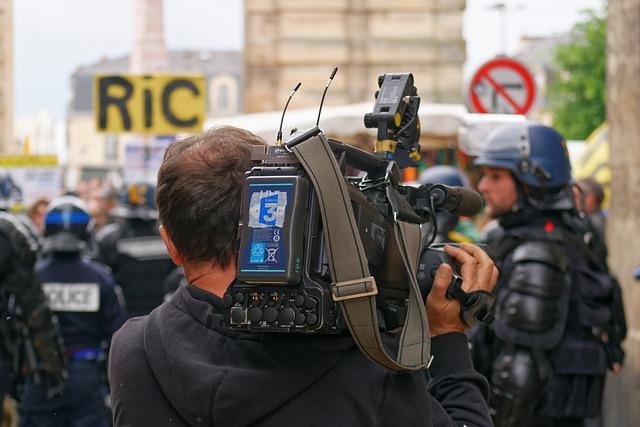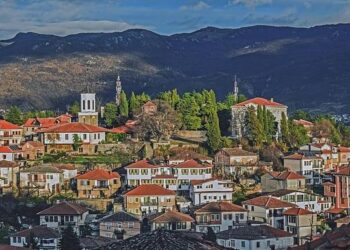In a decisive move underscoring the significance of media freedom in the region, the Steering committee of the Council of Europe has reaffirmed its commitment to safeguarding the rights of journalists in North Macedonia. At a recent meeting, committee members addressed ongoing challenges faced by media professionals in the country, highlighting the vital role a free press plays in upholding democratic values and ensuring accountability. This renewed dedication is particularly crucial as North Macedonia navigates a complex political landscape, where press freedom remains a contentious issue. as the nation strives for greater integration into European structures, the Council of Europe’s pledge to bolster journalistic protection not only aims to enhance the safety of reporters but also to promote a more informed and engaged society. This article delves into the key resolutions made by the committee,the current state of media freedom in North Macedonia,and the implications for journalists in their pursuit of truth and transparency.
Steering Committee outlines Key Principles for Media Freedom in North macedonia

The recent meeting of the Steering Committee has highlighted several key principles essential for safeguarding media freedom in North Macedonia. Among the notable principles reiterated were:
- protection of Journalists: Ensuring the safety and legal rights of media professionals to report without fear of retaliation.
- Transparency and Accountability: Emphasizing the need for government transparency in media dealings and holding accountable those who infringe upon media rights.
- Support for Independent Media: Advocating for diverse media landscapes that promote unbiased reporting and pluralism.
- Public Engagement: Encouraging civic participation in media discussions to foster a well-informed society.
Moreover,the committee has proposed actionable measures to enhance the local media climate. These include:
| Action Item | Objective |
|---|---|
| strengthen Legal Frameworks | Improve laws safeguarding freedom of expression and protection for journalists. |
| Training and Resources | Provide resources and training programs aimed at ethical journalism and investigative reporting. |
| Monitoring and Reporting Mechanisms | Establish systems to track violations of media rights and report them transparently. |
Urgent Measures Proposed to Enhance Journalist Safety and protection

The recent discussions within the Steering Committee have stressed the need for immediate action to combat the rising threats faced by journalists in North Macedonia. These threats undermine not only individual safety but also the broader health of democracy and freedom of expression. In light of this, key proposals have been made, including:
- Enhanced Training Programs: Developing specialized training sessions focused on risk assessment and crisis management specifically tailored for journalists.
- Legal Reforms: Advocating for stronger legal frameworks that safeguard journalists from harassment and violence.
- Emergency Response Mechanisms: Establishing a rapid response team to assist journalists in situations of immediate danger.
Furthermore, to monitor and evaluate the effectiveness of these measures, the Steering Committee plans to implement a systematic approach to collect data regarding attacks on press freedom. A proposed initiative includes:
| Measure | Objective | Expected Outcome |
|---|---|---|
| Annual Safety Audits | Assess risks and vulnerabilities | Improved safety protocols |
| Public Awareness Campaigns | Educate the public on press freedom | Greater public support for journalists |
| Collaboration with NGOs | Strengthen protective networks | Enhanced legal support for journalists |
Assessment of Current Challenges Facing Media Professionals in the Region

Media professionals in North Macedonia face a multitude of challenges that hinder their ability to perform effectively and safely. Censorship remains a constant threat, with pressures from both governmental and non-governmental entities impacting journalistic integrity. Many reporters express concerns about potential harassment or intimidation when covering stories that are critical of powerful figures or institutions. Additionally, issues related to financial instability within media organizations further complicate the environment, leading to diminished resources for investigative journalism and essential reporting. These factors collectively contribute to a climate that often stifles freedom of expression.
Moreover, the rise of digital misinformation poses another significant challenge. With the proliferation of social media platforms, media professionals are tasked with combating false narratives while striving to maintain trust among their audiences. This epidemic not only undermines credible journalism but also creates an atmosphere of uncertainty regarding credible sources of information. The following points highlight key challenges currently impacting the media landscape:
- Threats to Safety: Journalists face intimidation and violence.
- Financial Constraints: media outlets struggle with funding, affecting reporting resources.
- Digital Misinformation: The rapid spread of fake news undermines journalistic credibility.
- Censorship Pressures: There are constant attempts to control media narratives.
Collaboration with Local Stakeholders to Strengthen Media Independence

In a pivotal move towards enhancing media independence, the Steering Committee is actively engaging with local stakeholders including government bodies, civil society organizations, and media professionals. This collaboration aims to create an ecosystem where the freedom of the press is not only upheld but also celebrated. By fostering dialog and sharing best practices, stakeholders are encouraged to participate in the formulation of policies that protect journalists from intimidation and harassment. The commitment to media independence is further underscored by initiatives that promote awareness of the critical role a free press plays in democracy.
moreover, the involvement of local stakeholders ensures that the initiatives are tailored to the specific challenges facing the media landscape in north macedonia. By establishing platforms for ongoing collaboration, stakeholders can work towards key goals such as:
- Enhancing journalist safety: Implementing frameworks that ensure reporters can work without fear.
- encouraging diversity in media ownership: promoting a range of voices and viewpoints in the media.
- Strengthening legal protections: Advocating for laws that safeguard press freedom.
Through these concerted efforts, the Steering Committee aims to build a resilient media framework that not only supports journalists but also empowers citizens with a rich diversity of information.
Future Directions: Strategic Initiatives for a Resilient Press Ecosystem

As the media landscape continues to evolve, the Steering committee emphasizes the necessity for strategic initiatives that bolster press freedom and enhance the safety of journalists in North Macedonia. Adopting a multi-faceted approach, the committee proposes the following key initiatives aimed at fostering a robust and resilient press ecosystem:
- Enhanced Legal Framework: Strengthening existing legislation to ensure thorough protections for journalists against harassment and violence.
- Training and Education: Implementing specialized training programs to equip journalists with tools to navigate challenges related to misinformation and legal threats.
- Community Engagement: Encouraging collaboration between media professionals and civic organizations to raise awareness about the vital role of press freedom in democracy.
Furthermore, fostering an environment of transparency and dialogue between media entities and government bodies is crucial. Establishing regular forums can facilitate discussions addressing ongoing challenges faced by journalists.The committee also recognizes the importance of technology in supporting these goals. As outlined below, key technological resources can greatly enhance journalistic safety:
| technology Resource | Benefit |
|---|---|
| Secure Dialogue Tools | Protects journalists from surveillance and breaches of privacy. |
| Data Visualization Software | Assists in effectively communicating complex information. |
| Digital Safety Training | Equips journalists with skills to protect their digital assets. |
Insights and Conclusions
the recent reaffirmation by the Steering Committee of the Council of Europe regarding media freedom and journalist protection in north Macedonia marks a significant step towards fostering an environment conducive to free expression.This commitment highlights the importance of safeguarding journalists as they play a crucial role in a democratic society. As North macedonia navigates its path toward strengthened democratic institutions, the unwavering support from international bodies underscores the need for ongoing vigilance and action in protecting the rights of media professionals. Stakeholders, including governmental authorities and civil society, must continue to collaborate and uphold these principles, ensuring that the voices of journalists are heard and respected, and that media freedom thrives in the region.
















